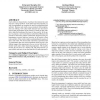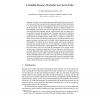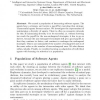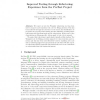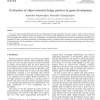67 search results - page 6 / 14 » Analyzing the Use of Quick Response Codes in the Wild |
113
Voted
SOFTVIS
2010
ACM
15 years 2 months ago
2010
ACM
Code smells are characteristics of software that indicate that code may have a design problem. Code smells have been proposed as a way for programmers to recognize the need for re...
105
click to vote
VMCAI
2009
Springer
15 years 8 months ago
2009
Springer
Abstract. Because of its critical importance underlying all other software, lowlevel system software is among the most important targets for formal verification. Low-level systems...
120
Voted
AAMAS
2002
Springer
15 years 1 months ago
2002
Springer
We control a population of interacting software agents. The agents have a strategy, and receive a payoff for executing that strategy. Unsuccessful agents become extinct. We investi...
131
Voted
TAICPART
2010
IEEE
15 years 7 days ago
2010
IEEE
We report on how the Wrangler refactoring tool has been used to improve and transform test code for Erlang systems. This has been achieved through the removal of code clones, the i...
134
Voted
INFSOF
2007
15 years 1 months ago
2007
The use of object-oriented design patterns in game development is being evaluated in this paper. Games’ quick evolution, demands great flexibility, code reusability and low mai...
